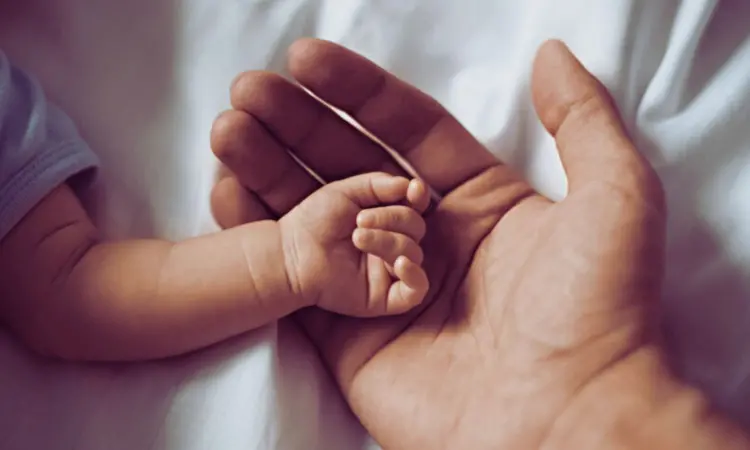- Home
- Medical news & Guidelines
- Anesthesiology
- Cardiology and CTVS
- Critical Care
- Dentistry
- Dermatology
- Diabetes and Endocrinology
- ENT
- Gastroenterology
- Medicine
- Nephrology
- Neurology
- Obstretics-Gynaecology
- Oncology
- Ophthalmology
- Orthopaedics
- Pediatrics-Neonatology
- Psychiatry
- Pulmonology
- Radiology
- Surgery
- Urology
- Laboratory Medicine
- Diet
- Nursing
- Paramedical
- Physiotherapy
- Health news
- Fact Check
- Bone Health Fact Check
- Brain Health Fact Check
- Cancer Related Fact Check
- Child Care Fact Check
- Dental and oral health fact check
- Diabetes and metabolic health fact check
- Diet and Nutrition Fact Check
- Eye and ENT Care Fact Check
- Fitness fact check
- Gut health fact check
- Heart health fact check
- Kidney health fact check
- Medical education fact check
- Men's health fact check
- Respiratory fact check
- Skin and hair care fact check
- Vaccine and Immunization fact check
- Women's health fact check
- AYUSH
- State News
- Andaman and Nicobar Islands
- Andhra Pradesh
- Arunachal Pradesh
- Assam
- Bihar
- Chandigarh
- Chattisgarh
- Dadra and Nagar Haveli
- Daman and Diu
- Delhi
- Goa
- Gujarat
- Haryana
- Himachal Pradesh
- Jammu & Kashmir
- Jharkhand
- Karnataka
- Kerala
- Ladakh
- Lakshadweep
- Madhya Pradesh
- Maharashtra
- Manipur
- Meghalaya
- Mizoram
- Nagaland
- Odisha
- Puducherry
- Punjab
- Rajasthan
- Sikkim
- Tamil Nadu
- Telangana
- Tripura
- Uttar Pradesh
- Uttrakhand
- West Bengal
- Medical Education
- Industry
Child Depression Fluctuations may trigger Parent Depression not vice versa: JAMA

A new study published in the Journal of American Medical Association showed that parent depression is influenced by changes in children's depression symptoms, but not the other way around, highlighting the importance of family-focused mental health interventions.
Studies have repeatedly demonstrated a connection between depression in parents and children. It is often believed that the development, duration, and even worsening of child depression are preceded by parent depression. It is conceivable, though seldom verified, that parent depression is triggered by kid depression.
Designing and promoting family-centered approaches to pediatric treatment requires elucidating the direction and developmental timing of these connections. Hewitt and team used exploratory analyses in this study to see if family income and child sex affected the relationships between mother and child depression.
Children aged 10.3 (May 20 to July 15, 2020), 10.9 (March 4 to April 30, 2021), 11.6 (November 22, 2021 to January 17, 2022), and 12.8 (January 16 to July 7, 2024) years were included in this study's data from the All Our Families (Calgary, Alberta, Canada) cohort during and after the COVID-19 pandemic.
The main exposure was the report of depressed symptoms by both the mother and the child. The Center for Epidemiologic Studies Depression Scale-10 for mother depression and the Behavior Assessment System for Children for child depression.
A total of 1,801 mother-child pairs (52% males, 48% girls) were included in the sample. At study entrance, the mothers' mean (SD) age was 41.6 (4.4), and the majority had earned over CAD $100,000 per year (75%), been married or in a common-law relationship (71.4%), and finished postsecondary education (80%).
Throughout the course of the investigation, steady between-participant connections for mother depression and child depression were reflected in the consistent cross-sectional correlations that were found.
There was no correlation between within-participant increases in maternal depression scores at child ages 10.9 (standardized coefficient 0.12; 95% CI, 0.02-0.22) and 11.6 (0.17; 95% CI, 0.07-0.26) years and subsequent increases in child depression scores at ages 10.3 and 10.9 years.
Household income moderated these patterns of correlations (difference test for χ212 = 23.0; P =.03), and increases in child depression within the higher income group were consistently linked to increases in mother depression later on. Overall, contrary to popular belief, these results imply that rather than the other way around, the depression of the children may have exacerbated the depression of the mother over time.
Reference:
Hewitt, J. M. A., McArthur, B. A., Neville, R. D., Park, J. L., Tough, S., & Madigan, S. (2025). Testing bidirectional associations between maternal and child depression during emerging adolescence. JAMA Pediatrics. https://doi.org/10.1001/jamapediatrics.2025.2822
Neuroscience Masters graduate
Jacinthlyn Sylvia, a Neuroscience Master's graduate from Chennai has worked extensively in deciphering the neurobiology of cognition and motor control in aging. She also has spread-out exposure to Neurosurgery from her Bachelor’s. She is currently involved in active Neuro-Oncology research. She is an upcoming neuroscientist with a fiery passion for writing. Her news cover at Medical Dialogues feature recent discoveries and updates from the healthcare and biomedical research fields. She can be reached at editorial@medicaldialogues.in
Dr Kamal Kant Kohli-MBBS, DTCD- a chest specialist with more than 30 years of practice and a flair for writing clinical articles, Dr Kamal Kant Kohli joined Medical Dialogues as a Chief Editor of Medical News. Besides writing articles, as an editor, he proofreads and verifies all the medical content published on Medical Dialogues including those coming from journals, studies,medical conferences,guidelines etc. Email: drkohli@medicaldialogues.in. Contact no. 011-43720751


